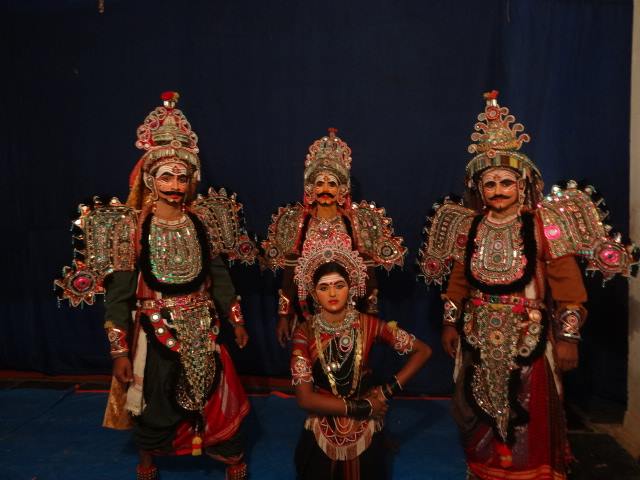Prakash Garud
Grant Period: Over one year
This grant supports Dharwad-based researcher and theatre practitioner, Prakash Garud, to research into Doddata, a folk performance tradition of north Karnataka. Prakash’s engagement with Doddata intensified when he was working on his doctoral dissertation on the Company Theatre era in north Karnataka. Photographs and play scripts that he inherited from his grandfather, Garud Sadashiv Rao, one of the doyens of Company theatre, signalled to the artistic transactions that could have taken place between Doddata and Company plays. Taking this investigation further, Prakash now aims to study the processes by which Doddata as a folk form survived the onslaught of urban middle class theatre.
The performance tradition of Doddata belongs to the many ritual-folk Bayalata (outdoor performance) forms that have flourished in Karnataka,. Doddata (literally meaning ‘big play’ in Kannada) is a 200-year old folk performance tradition based on grand mythological themes. The form received immense patronage from zamindars and the common village folk during the latter half of the 19th century. It was during this time that Doddata flourished across the North Karnataka region, gaining popularity. The coming of Parsi and Company theatre in the early part of the 20th century to the Bombay Presidency dealt a huge blow both to the patronage and popularity of Doddata. The emergence of the middle class intelligentsia that heralded new cultural practices led to the marginalisation of Doddata as being artistically inferior. The influence of the Marathi Company theatre quickly spread across the Dharwad, Gadag, Belgaum and Bijapur regions that then belonged to the Bombay Presidency. Besides the exciting interchanges that took place between Marathi and Kannada musicians and theatre practitioners during the years of Company plays, this period also resulted in the fashioning of modern Kannada theatre and the formation of the ‘Kannada’ linguistic identity that came as a counterpoint to the ‘Marathi-ness’ that was being constructed by the Marathi Company’s plays. In the ensuing politics of the formation of linguistic states, Doddata - the form, its practice and its language - suffered a serious setback.
Doddata began to imbibe a lot of elements from Company plays in order to keep pace with the changing times. Religious institutions, especially the Veershaiva maths in north Karnataka, began to use Doddada and other such forms in the region to further their own agendas. This also impacted the trajectory and aesthetics of Doddata. Prakash’s research is an intense inquiry into these complex processes. Through interviews with existing Doddata practitioners, people that were involved in Company theatre and a documentation of Doddata performances across Dharwad, Haveri, Belgaum, Gadag, Bellary, Raichur, Gulbarga, and other places in north Karnataka, this research aims to understand the journey of Doddata and the ways in which it has invented and reinvented itself in response to changing times.
This grant was made possible with support from the Sir Ratan Tata Trust (SRTT).




